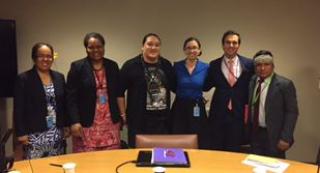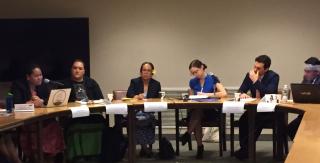Climate-Induced Migration: United Nations Forum on Indigenous Issues
By Lyle Davison
The Permanent Forum on Indigenous Issues (PFII) is a two-week long conference that was established on July 28th, 2000 by the United Nations to address the unique issues indigenous comminutes face related to economic and social development, ecological and cultural preservation, and human rights. The conference brings together NGOs, policy makers, advocates, civil society organizations, indigenous leaders, and activists to discuss the global challenges facing Indigenous communities that are often marginalized. The 16th session of the PFII took place this year on April 24th through May 5th, 2017 around a reflective theme “Tenth Anniversary of the United Nations Declaration on the Rights of Indigenous Peoples: Measures Taken to Implement the Declaration.”
At the 16th session of the PFII, the Unitarian Universalist United Nations Office (UU-UNO) co-hosted an official side event held at the United Nations Headquarters. The event addressed climate-induced migration specifically impacting the livelihoods of indigenous communities around the world. We were able to get a fantastic group of panelists, dynamic audience, and had a great turnout at the event.

The panelists included (left to right):
Sunema Pie Simati of the Permanent Mission of Tuvalu to the United Nations
Salote Soqo of the Unitarian Universalist Service Committee
Prairie Rose Seminole of the American Indian Alaska Native Ministries Evangelical Lutheran Church in America
Teresa Blumenstein (Moderator) of the Committee on Migration
Juan Elias Chebly of the United Nations Environment Programme
Adelson Kora Kanamary of the Kanamary people of the Amazon
The event started off with a beautiful song by one of our panelists, Prairie Rose Seminole who represented the American Indian Alaska Native Ministries. Prairie Rose Seminole is a native person herself from North Dakota, which is a state at the forefront of indigenous issues due to the construction of the Dakota Access Pipeline that runs straight through indigenous tribal lands. Sunema Pie Simati from the Permanent Mission of Tuvalu to the United Nations showed a video about her home country. The movie showcased how rising sea levels threaten the entire nation’s livelihood in the Pacific Island Nation of Tuvalu. Since 2004, multiple islands in Tuvalu have been swallowed by the sea, and the chronic coastal erosion may result in Tuvalu becoming the first country to disappear because of climate change.

Adelson Kora Kanamary (center) addresses fellow panelists & participants
A pattern of climate-induced migration can be traced in Latin America, specifically the Amazon jungle. Indigenous activist Adelson Kora Kanamary, of the Kanamary people of the Amazon, spoke on how climate change has caused seasons in the Amazon to change, consequently drying some rivers, destroying the undersea ecosystem, and negatively affecting crop cultivation. The indigenous people are not able to get enough food, hence being forced to migrate to other parts of the Amazon. Similarly Prairie Rose spoke about an Alaskan tribe that was living on an island off the Alaskan coast, which was losing about 5 feet of land every year due to land erosion. The livelihood of indigenous inhabitants, specifically their access to health care, is impeded by the drastic changes to the environment. For example, the lack of ice on the island makes it hard for medical helicopters to deliver necessary medical assistance. Ultimately, this island in Alaska held a vote on whether or not to stay on the island and it was decided that they must leave to survive. Prairie Rose explained the trauma of lost history, identity, and livelihood for the island people, because indigenous identity is closely tied to the land & ecosystem.
All of the panelists agreed that we need a more appropriate global response to the threat of climate change. Sunema pointed out that there are currently no international laws that protect people who are displaced because of climate change. There is no system in place to help indigenous communities who are losing their homes, history, and their entire way of life. There was a discussion about the Green Climate Fund set up through the Paris Climate Agreement, which would fund solutions to climate change induced issues in developing nations. The Fund aims to raise $100 million a year but so far only has $10 million; the fund is combination of pledges by few countries with only $3 million pledged by the United States.

Salote Soqo (left) addresses fellow panelists & participants
The threat and reality of climate induced migration and extinction is and will continue to be prevalent among many indigenous communities and island nations. Our panelist Salote Soqo from the Unitarian Universalist Service Committee gave us some numbers on expected human migration. By 2050, about 1 million people are going to be permanently displaced due to the effects of climate change. Juan Elias Chebly from the United Nations Environment Programme shared what the UN is doing to mitigate and reduce the impacts of climate change and to address the needs migrants. He spoke about how the Paris Agreement and Green Climate Fund would not only help mitigate the effects of climate change but would also fund protection against climate induced issues in developing countries and for marginalized communities like indigenous people. All panelists emphasized the importance of respecting the severity and wisdom of the at-risk indigenous communities. The panelists discussed how when handling climate induced displacement cases, the priority must be to protect Indigenous peoples’ right to self-determination, relocation must be voluntary, and final decisions must be made by the communities that are affected.
After all of our panelists presented, we had time for open discussion, and questions from the audience were heard. One of the most compelling questions asked was “What should the UN do about migration? And how do we keep people focused on the issues of climate change and migration with everything going on in the world?” Our panelists recommended ensuring that any policy created about migration must internationally wave in marginalized communities and recognize their unique and dire challenges. The incorporation of civil society, NGOs, and grassroots communities might be key in keeping climate change in the forefront of discussion at the UN. Everyone needs to be intentional about their actions in order to reduce and mitigate climate change and forced migration. There are a lot of things we can do in our every day lives to help mitigate the effects of climate change. Techniques like divesting from banks that support oil pipelines and fossil fuels, buying local and keeping an ethical diet are helpful in reducing the impact of climate induced migration in the long run.
The panel was brought to a close with everyone holding hands and listening to a prayer song sung by Adelson Kora Kanamary. The panel was a huge success and I am so grateful to have had the opportunity to work with the UU-UNO and alongside the UN NGO Committee on Migration and The Daughters of Charity to put on this event and learn about the struggles of Indigenous communities that are being displaced because of climate change. I hope the success of the event motivates you to live out the shared Unitarian Universalist principles boldly. May this blog inspire you and your congregation to creatively support the cause by joining the Love Resists campaign, supporting UU-UNO & UUSC initiatives, dedicating a sermon, or hosting a church event.